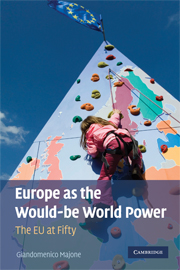Book contents
- Frontmatter
- Contents
- Acknowledgements
- Introduction
- 1 An Elitist Project
- 2 Federalism Old and New
- 3 Cryptofederalism
- 4 Unintended Consequences of Cryptofederalism
- 5 The Mirage of Social Europe
- 6 The Democratic Deficit and All That
- 7 The Obsolescence of the Traditional Integration Methods
- 8 Unity in Diversity
- References
- Index
3 - Cryptofederalism
Published online by Cambridge University Press: 05 August 2012
- Frontmatter
- Contents
- Acknowledgements
- Introduction
- 1 An Elitist Project
- 2 Federalism Old and New
- 3 Cryptofederalism
- 4 Unintended Consequences of Cryptofederalism
- 5 The Mirage of Social Europe
- 6 The Democratic Deficit and All That
- 7 The Obsolescence of the Traditional Integration Methods
- 8 Unity in Diversity
- References
- Index
Summary
Federalist Revisionism
After the collapse of the European Defence Community in 1954, and the consequent abortion of the pre-federal EPC, most federalists chose to continue the struggle, so to speak, underground. They pursued political integration under the guise of economic integration – the strategy that came to be known as the Monnet method, or, more descriptively, as the method of integration by stealth. I use the label ‘cryptofederalism’ to denote a type of federalist revisionism characterized by this roundabout approach to the political integration of Europe. The approach of the revisionists is obviously different from the strategy of the orthodox, or ‘Hamiltonian’, federalists, who openly worked for a constitution dividing the powers of government between a federal Europe and its member states, with democratic institutions at each level, and with federal powers in all fields of common interest, including foreign affairs, security, and defence.
In the decade following the end of World War II, federalism, although always an elite movement, had been a non-negligible factor in European politics, especially in Germany, Italy, and the Netherlands. Already by the mid-1950s, however, the federalist vision had lost its credibility and whatever popularity it had enjoyed for a few years after the end of World War II. The underlying reason for the loss of credibility and public support has been mentioned in the preceding chapter: all the analyses and predictions inspired by that vision had been refuted by history. The rise of cryptofederalism can only be understood against this background of wishful conjectures and factual refutations. In this respect there are some suggestive analogies between the federalist revisionism of the 1950s and the Marxist revisionism of the 1890s.
- Type
- Chapter
- Information
- Europe as the Would-be World PowerThe EU at Fifty, pp. 72 - 99Publisher: Cambridge University PressPrint publication year: 2009



